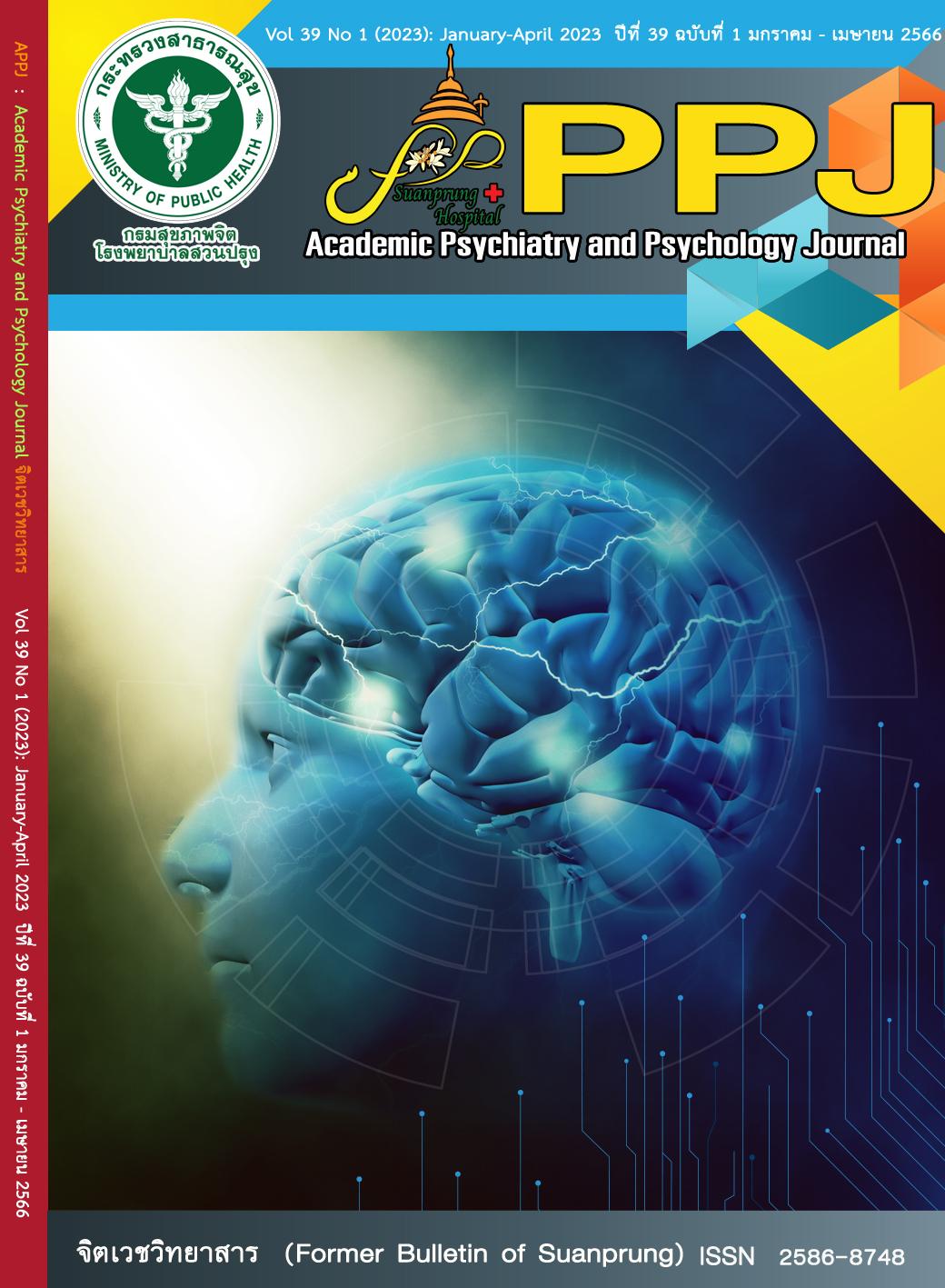The Effects of Community Happiness Program on Happiness and Resilience Quotient of Working Age People
Main Article Content
Abstract
Objective: This study aimed to determine the effect of Community Happiness Program on happiness and resilience quotient of working age people.
Materials and Methods: A quasi-experimental research with two-group pretest-posttest design was performed on the working-age people of Rongkwang District, Phrae Province with 50 people in each group. The experimental group received the Community Happiness Program, which has 4 activities: finding the good points of other people, having a warm family, and having life balance with the 8-8-8 principle. The control group received normal care. The data was collected between May 2022 to October 2022. Data collection comprised questionnaires, and case record forms. The data were analyzed using descriptive statistics, paired T-test, and independent T-test.
Results: The effects of Community Happiness Program indicated that the experimental group had a higher happiness score (mean difference of 13.5 points, p<0.001), and resilience quotient score (mean difference of 12.3 points, p<0.001). The happiness level and resilience quotient level were better than the control group.
Conclusions: The Community Happiness Program may increase the happiness and resilience quotient.
Article Details

This work is licensed under a Creative Commons Attribution-NonCommercial-NoDerivatives 4.0 International License.
บทความหลังผ่านการปรับแก้จากกองบรรณาธิการแล้ว เป็นลิขสิทธ์ของวารสารจิตเวชวิทยาสาร โรงพยาบาลสวนปรุง กรมสุขภาพจิต กระทรวงสาธารณสุข ห้ามเผยแพร่เพื่อประโยชน์ทางการค้าโดยไม่ได้รับอนุญาต แต่อนุญาตให้เผยแพร่บทความดังกล่าวเพื่อประโยชน์ทางการศึกษาแก่ประชาชนทั่วไป ทั้งนี้กองบรรณาธิการไม่จำเป็นต้องเห็นด้วยกับบทความหรือข้อคิดเห็นใดๆ ที่ปรากฏในวารสารสวนปรุง
References
Office of the National Economic and Social Development Commission, Prime Minister's Office. National Economic and Social Development Plan No. 12(2017-2021). Bangkok: Prime Minister's Office; 2017. (In Thai)
Tantipiwattanaskul, W., Aekanong Sritalaphinan. Happiness strategy handbook. Bangkok: Creative guru Co., Ltd.; 2554. (In Thai)
Department of Mental Health. Department of Mental Health advice 10 ways to create happiness in work 2018. [cited 2022 May 28]. Available from: http://www.prdmh.com. (In Thai)
Rongkwang Hospital Information Center. Patient statistics from 2019 to 2021. Phrae; 2021. (In Thai)
Sanguan Suthilertarun. Human behavior and self development. Bangkok: Aksaraphiphat: 2543; 346-47. (In Thai)
Office of Mental Health Promotion and Development Department, Department of Mental Health, Ministry of Public Health. The Create Happiness Program of the working age in the community. Bangkok: Beyond Publishing Co., Ltd.; 2017: 1-25. (In Thai)
Wittayakorn S, Editors. Psychology for create happiness. Bangkok: Sai Than; 2005:1-7. (In Thai)
Department of Psychosocial Health, Department of Mental Health, Ministry of Public Health. Resilience Quotient. Bangkok: Deenado media plus Co., Ltd.; 2009: 61-67. (In Thai)
Rabiei, L., Mazaheri, M. A., Masoudi, R.. & Hasherninia, S. A. M. Fordyce happiness program and postpartum depression, journal of Research in Medical Sciences: The Offcial Journal of Istahan University of Medical Sciences. 2014; 19(3): 251-256.
Bolier, L.. Haverman, M., Westerhof, G. J., Riper, H., Smit, F.. & Bohlmeijer, E. Positive psychology interventions: A meta-analysis of randomized controlled studies, BMC Public Health. 2013; 13(1): 1-20.
Khazaee-Pool, M. Sadeghi, R., Majlessi, F., & Rahini F. A. Effects of physical
exercise programme on happiness among older people. Journal of Psychiatric
and Mental Health Nursing. 2015; 22(1): 47-57.

